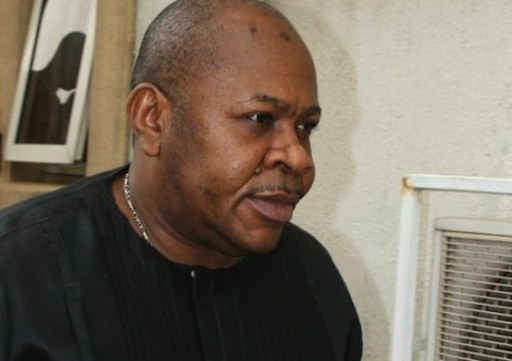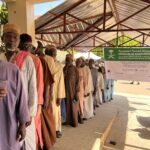The Economic and Financial Crimes Commission (EFCC) has re-arrested Lagos socialite Fred Ajudua over a $1.43 million fraud case that has lasted about two decades.
PREMIUM TIMES learnt from sources without authority to discuss the matter with the media that the anti-graft agency’s operatives arrested Mr Ajudua in Abuja on Tuesday.
The development came just days after Friday’s judgement of the Supreme Court revoking a 2018 controversial bail granted to him by the Lagos Division of the Court of Appeal in a case the EFCC has been prosecuting since 2005.
The Supreme Court’s ruling upholding the EFCC’s appeal against the bail ordered Mr Ajudua’s arrest and his detention in a correctional centre.
The EFCC is set to continue proceedings against Mr Ajudua in a fraud trial that has spanned nearly two decades, moving through multiple judges while facing numerous obstacles and systemic challenges in the Nigerian courts.
These setbacks have prolonged the trial, making it one of the longest-running fraud cases in Nigeria’s trial courts.
Mr Ajudua is standing trial for allegedly obtaining over $1 million ($1,043,000) from a Palestinian, Zad Abu Zalaf, under false pretences in 1993.
Mr Ajudua faces 12 amended counts of conspiracy to obtain money by false pretence, forgery, and uttering forged documents before trial judge Mojisola Dada of the Lagos State High Court, Ikeja.
The Supreme Court’s Friday’s decision restored the ruling of Ms Dada, who had previously refused Mr Ajudua bail due to what she described as a history of frustrating judicial proceedings.
Case timeline
The fraud case, which has spanned decades, was first assigned to M.O. Obadina in 2005.
Mr Ajudua failed to appear in court on at least 24 occasions between 2005 and 2009, stalling his arraignment.
The case was eventually struck out in 2009 and only reinstated in 2017 following EFCC’s application to re-list the matter.
In June 2018, Mr Ajudua was finally arraigned before Ms Dada after the case had passed through multiple judges.
However, the Court of Appeal later granted him bail and ordered that the case be transferred to a new judge to start afresh.
But the EFCC was dissatisfied with the appellate court’s decisions, and approached the Supreme Court.
The Supreme Court agreed with the commission and reversed both rulings.
The Supreme Court ordered Mr Ajudua’s remand in a correctional facility and directed that the case continue before Ms Dada.
Key witness testimony
At the heart of the allegations is the testimony of German businessman Michael Kreamer, who claimed he was introduced to Mr Ajudua through Mr Zalaf.
Mr Kreamer, a luxury car dealer, testified that he gave Mr Zalaf $550,000 in cash in 1993 to support a purported business deal with Mr Ajudua in Nigeria.
Testifying before Ms Dada, Mr Kreamer recounted how he was convinced of Mr Ajudua’s credibility after visiting an office filled with exotic cars and men in uniform.
He said he handed over the money after receiving what he thought was a legitimate receipt signed by Mr Ajudua.
However, upon returning to Germany, he received no communication from Mr Zalaf and eventually discovered he had been defrauded.
According to the EFCC, Mr Ajudua and his alleged accomplice, Joseph Ochunor (still at large), forged documents purportedly issued by the Central Bank of Nigeria and the Nigerian National Petroleum Corporation to give the scam credibility.
The prosecution said they fraudulently obtained $268,000 from Mr Zalaf on 2 April 1993, and an additional $225,000 on 12 May 1993.
Medical bail controversy
Mr Ajudua, who previously claimed to suffer from serious health conditions including a single functional kidney, secured bail on medical grounds in a similar case before another judge, Josephine Oyefeso.
READ ALSO: Naira Abuse: EFCC bows to pressure, vows to probe Tompolo
The defence’s lawyer, Norrison Quakers who is a Senior Advocate of Nigeria (SAN), argued for similar leniency in the current case.
But the EFCC opposed the application, citing Mr Ajudua’s history of absconding and failing to meet court dates.
Mr Dada denied him bail, ruling that the health-related adjournments had already delayed the trial for over 13 years and that further delays were unjustifiable.
In its ruling, the Supreme Court held that the appeal challenging the transfer of the case to another judge for a new trial had become academic, since it had also reversed the bail decision.
It directed the chief judge of Lagos State to ensure the matter resumes promptly before Ms Dada.
Support PREMIUM TIMES’ journalism of integrity and credibility
At Premium Times, we firmly believe in the importance of high-quality journalism. Recognizing that not everyone can afford costly news subscriptions, we are dedicated to delivering meticulously researched, fact-checked news that remains freely accessible to all.
Whether you turn to Premium Times for daily updates, in-depth investigations into pressing national issues, or entertaining trending stories, we value your readership.
It’s essential to acknowledge that news production incurs expenses, and we take pride in never placing our stories behind a prohibitive paywall.
Would you consider supporting us with a modest contribution on a monthly basis to help maintain our commitment to free, accessible news?
TEXT AD: Call Willie – +2348098788999





